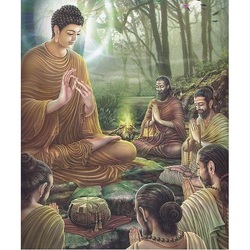Gautama Buddha, the
historical Buddha, lived between about 563 and 483 BC in India on
the border of present-day Nepal. He was a son of the King Sudhodana, ruler of the tribe called the Sakyas (from where Buddha derived the title
Sakyamuni, meaning "Sage of the Sakyas"). The young prince also received the name of Siddhartha. He maintained a privileged life behind the palace walls until one
day he decided to visit the nearby town. The king called for everything to be
swept and decorated, and any disturbing, unpleasant, or sad sight to be removed. But while Gautama was travelling through the streets,
an old wrinkled man appeared before him. In astonishment the young prince
learned that decrepitude is the fate of those who live long enough. Later he saw someone seriously ill, and then a funeral procession with a corpse, both of which opened his eyes to suffering and death. Finally
he met an ascetic, a beggar, who told Gautama that he had left the world to
pass beyond suffering and joy, to attain peace at heart.
Gautama left his palace, wife, and child, and became an
ascetic for about 6 years, desiring to understand and eliminate suffering. Although he achieved deep meditation states,
his body suffered and he did not achieve peace.
Finally, he achieved the realization that there is a middle way between
selfish indulgence and asceticism. He
became aware of what are now known as the Four Noble Truths – that suffering (dukkha) is universal, the cause of
suffering, that suffering can be overcome, and the path by which it can be
overcome. With this insight, he became
the Buddha, which simply means one who is awake.
Dukkha:
Although this is usually translated into English as suffering, dis-ease, unsatisfactoriness, discomfort, anxiety, and stress may be somewhat better. There are several types of dukkha.
Gompopa (in the “Jewel Ornament of Liberation”) organizes them into
these three types:
1. Dukkha - Dukkha (Suffering of suffering): Ordinary
suffering or pain, which can be physical, emotional, or mental
2. Viparinama Dukkha (Suffering of Change): Suffering brought on by the truth of
impermanence, and our desire to keep things from changing.
3. Samkhara Dukkha (Suffering of Conditioned States;
All-Pervasive suffering): This is the trickiest to define. It's basically suffering
brought on by our neurotic habits, by being a self with the Five Skandhas (the
five aggregates that we mistake for “self”), which are constantly changing. In brief, we have bodies and things have forms, we have sensations and feelings, we have perceptions and cognitions, we have thoughts, opinions, prejudices, and attitudes, and we have consciousness. One way of thinking about it is that these five Skandhas maintain a reference to "self," which causes us to separate the world into self and other, which can cause suffering.
As you might have noticed from this list, suffering is much more complicated than it at first appears. In fact, the Buddha defined eight types:
"Now this, monks, is the Noble Truth of dukkha: Birth is dukkha, aging is dukkha, death is dukkha; sorrow, lamentation, pain, grief, & despair are dukkha; association with the unbeloved is dukkha; separation from the loved is dukkha; not getting what is wanted is dukkha. In brief, the five clinging-aggregates are dukkha." — SN 56.11
I tend to think that there is a ninth type of suffering - getting what we want.
Think about it. As soon as you get that thing you really desired, you start worrying about it. You get the fancy car and then begin stressing about it getting door dings, or breaking down, or stolen. Getting what you want begets dukkha when it gets boring (aging), when it breaks (death), when we worry about it getting stolen or harmed (distress), or after we've lost it (separation from the loved).
Basically, there is a dependent co-arising of both happiness and stress when we get what we want.
One place one can often see this clearly is in our romantic relationships. The very thing that attracts you so much to a person is usually the exact thing that is particularly annoying later on. For example, you are attracted to someone because of how flirty he is? He won't stop being flirty after he's with you, and then you might not like it as much. You are attracted to how free-spirited she is? It will be annoying when she doesn't fit neatly into the little box you would like to keep her in once you're together (c.f., the home for manic pixie dream girls video). You are attracted to how smart someone is, and what a great probing intellect he/she has? You might not like it later when he/she turns that probing critical mind on you!
The point is that we continually believe that getting what we want will make us happy, but that's clearly not true. Most of the time, getting what we think we want just maintains our suffering.
The good news is that the next three Noble Truths help us to understand why we suffer and how to stop.



No comments:
Post a Comment